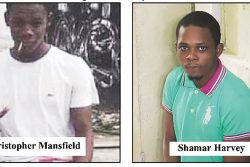Allowing an appeal of the conviction and sentence for the December 2011 murder of his wife, the Court of Appeal yesterday set aside that conviction against Michael Anthony Persaud, ordering that a new trial be conducted.
Persaud’s attorney, Glenn Hanoman said that the court in its ruling, highlighted several material irregularities which it noted were committed during the trial.
He said that acting Chancellor Yonette Cummings-Edwards said that the trial judge ought to have given further and better directions with regards to circumstantial evidence.

According to him, she noted, too, that the judge failed to adequately deal with the fact that the main prosecution witness had an interest to serve.
Persaud’s new trial is likely to come up as early as next month, when the new Demerara criminal assizes are scheduled to open.
Back in 2014, Justice Navindra Singh had sentenced Persaud to 83 years in prison, following his conviction by a jury for the murder of 19-year-old Maduri Padumdeo, whose nude body was discovered in the bedroom of her Lot 8 North Sophia apartment, with a black and white wire wrapped around her neck.
He would then appeal both his conviction and sentence—arguing that the trial judge committed a number of errors which resulted in a miscarriage of justice, and that the sentence imposed was too harsh.
Among the grounds on which he appealed his conviction and sentence, Persaud contended that Justice Singh failed to adequately direct the jury on how it needed to assess circumstantial evidence, failure of which he said resulted in a “substantial miscarriage of justice” and prejudice to his case.
According to him, he suffered a miscarriage of justice and his case was also prejudiced because the trial judge failed to adequately put his defence to the jury.
The appellant had also complained that having been initially unable to retain an attorney of his choice for the trial, Justice Singh erred in law when he refused to accede to his request for an adjournment so as to allow him to retain his own counsel.
The appellant declared that the judge erred by “personally and unilaterally” appointing and assigning counsel to him, without his consent.
In so doing, Persaud had expressed the view that his right to a fair trial was “irretrievably and adversely affected.” On this point, he complained of having been assigned a lawyer who did not take full instructions from him (Persaud).
He said that the lawyer failed to object among other things, to the admission into evidence of an “incriminating and prejudicial” caution statement which resulted in a miscarriage of justice and prejudice to his case.
The appellant said that Justice Singh himself wrongly decided to admit into evidence, the caution statement attributed to him thereby resulting in a substantial miscarriage of justice for several reasons.
Among those reasons he argued, was the fact that the statement was ruled as having been freely and voluntarily given by him (Persaud) in the absence of any evidential basis being laid and without consideration of fairness.
The appellant complained, too, that the statement had been wrongly admitted as an exhibit in the trial without clarification as to whether it was being admitted for the truth of its contents and without Justice Singh first directing his mind to issues surrounding its admissibility.
Hanoman had highlighted in his client’s notice of appeal that Justice Singh did not allow the statement to be read to the jury, or even refer to its actual contents in his directions to the jury.
Additionally, counsel said that the judge wrongly directed the jury to consider the prosecution’s case that the caution statement, together with other evidence, compelled a conclusion that Persaud was the only person with the deceased when she was killed.
Persaud’s appeal was heard by Justice Cummings-Edwards and Justices of Appeal Rishi Persaud and Dawn Gregory.








